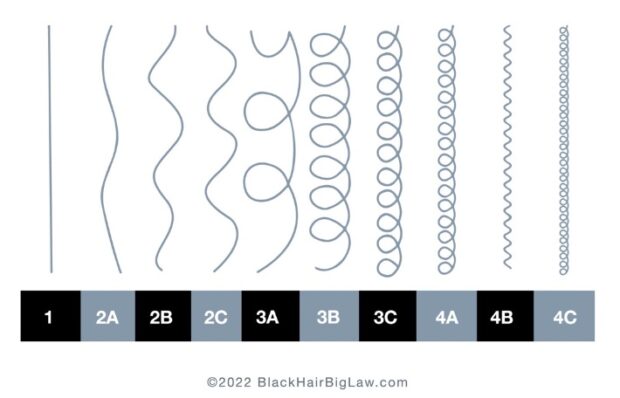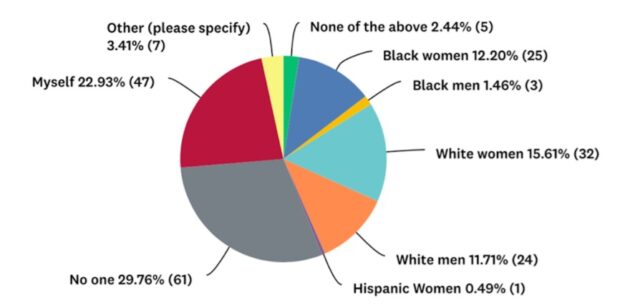
Black Hair, Big Law (Part II): The Harshest Critics Of Black Attorneys’ Hair
//
 Ed. note: This is the latest installment in a series of posts on motherhood in the legal profession, in partnership with our friends at MothersEsquire. Welcome Angela Mackie-Rutledge back to our pages. Click here if you’d like to donate to MothersEsquire.
Ed. note: This is the latest installment in a series of posts on motherhood in the legal profession, in partnership with our friends at MothersEsquire. Welcome Angela Mackie-Rutledge back to our pages. Click here if you’d like to donate to MothersEsquire.
In order to gain a greater appreciation of the encounters and situations that Black attorneys, paralegals, and law students face, I created a survey in conjunction with the Big Law Black Hair Symposium.
googletag.cmd.push( function() { // Display ad. googletag.display( "div-id-for-top-300x250" ); });I researched who had already done the serious in-depth quantitative investigations on Black hair and Big Law. There really wasn’t much out there. It dawned on me that the research I had anticipated doing would be the only research available on the topic.
 Sponsored NetDocuments’ Rebecca Sattin On Customer-First Approach And Future-Proofing Your Firm How a customer-focused transition from Worldox to NetDocuments sets the stage for a future of successful tech advancement. From Ethan Beberness
Sponsored NetDocuments’ Rebecca Sattin On Customer-First Approach And Future-Proofing Your Firm How a customer-focused transition from Worldox to NetDocuments sets the stage for a future of successful tech advancement. From Ethan Beberness The lack of existing research sharpened my focus. It soon became my fervent hope that the initial research I was to conduct would eventually be the basis for another student’s master’s or PhD thesis. I would lay the groundwork and someone else could pick up the baton and run with it.
The Basics
googletag.cmd.push( function() { // Display ad. googletag.display( "div-id-for-middle-300x250" ); }); googletag.cmd.push( function() { // Display ad. googletag.display( "div-id-for-storycontent-440x100" ); }); googletag.cmd.push( function() { // Display ad. googletag.display( "div-id-for-in-story-youtube-1x1" ); });The survey ran from September 10 through October 9, 2022, and was open to individuals of all races with a concentration on Black attorneys’ groups and Black student groups. In total, we received 205 responses. SurveyMonkey did the initial calculations which we followed up with more in-depth analysis by Kingsley Ukwuoma, a biostatistician and expert in systematic review and meta-analysis.
10 Questions
Sponsored Sponsored Survey Results: A Perspective On The Private Markets Ontra surveyed over 400 private markets professionals about what to expect this year and their legal process pain points. From Kerry G. Benn, Ontra
Sponsored Survey Results: A Perspective On The Private Markets Ontra surveyed over 400 private markets professionals about what to expect this year and their legal process pain points. From Kerry G. Benn, Ontra  Sponsored NetDocuments’ Rebecca Sattin On Customer-First Approach And Future-Proofing Your Firm How a customer-focused transition from Worldox to NetDocuments sets the stage for a future of successful tech advancement. From Ethan Beberness
Sponsored NetDocuments’ Rebecca Sattin On Customer-First Approach And Future-Proofing Your Firm How a customer-focused transition from Worldox to NetDocuments sets the stage for a future of successful tech advancement. From Ethan Beberness  Sponsored The Digital Transformation Imperative
Sponsored The Digital Transformation Imperative  Sponsored Documenting Secured Transactions: A New Guide For Practitioners A newly updated PLI treatise provides both the legal framework and practical guidance on documenting secured transactions, including important details about 2022 amendments to the UCC. From Practising Law Institute
Sponsored Documenting Secured Transactions: A New Guide For Practitioners A newly updated PLI treatise provides both the legal framework and practical guidance on documenting secured transactions, including important details about 2022 amendments to the UCC. From Practising Law Institute We asked 10 questions on our survey. We left the last question open for individuals to tell us more about their own personal hair situation. Although, we were limited, somewhat, by the free version of SurveyMonkey, the questions got to the heart and ethos of the information were looking to research. This article explores five of the ten questions.
Question 1: How would you classify your natural hair?

A straightforward synopsis of the survey informs us that 50.25% of the legal professionals who responded the survey had type 4 hair on the Andre Walker Hair Typing System. Andre is noted for having been Oprah’s stylist for many years.
Type 4 is a category of kinky, coily hair that many Black people have. While my survey doesn’t ask for racial classifications, this can be roughly presumed by the type of hair selected. Black individuals may have hair in more than one category, or they may have hair that is not within Type 4. Black and mixed-race people are greatly represented in hair Types 3B and 3C. As a rule of thumb, the closer the hair type is to Type 1, the less likely the person is likely to be of African descent. Of course, this is only a generality, and exceptions apply.
Sponsored Sponsored LawPay Pro Offers Upgraded Time And Billing Essentials AffiniPay’s latest product for the legal community, introduced earlier this year, presents a simple web-based solution for attorneys seeking seamless firm cash flow. From Above the Law
Sponsored LawPay Pro Offers Upgraded Time And Billing Essentials AffiniPay’s latest product for the legal community, introduced earlier this year, presents a simple web-based solution for attorneys seeking seamless firm cash flow. From Above the Law  Sponsored Documenting Secured Transactions: A New Guide For Practitioners A newly updated PLI treatise provides both the legal framework and practical guidance on documenting secured transactions, including important details about 2022 amendments to the UCC. From Practising Law Institute
Sponsored Documenting Secured Transactions: A New Guide For Practitioners A newly updated PLI treatise provides both the legal framework and practical guidance on documenting secured transactions, including important details about 2022 amendments to the UCC. From Practising Law Institute Question 2: What is your occupation?
- 43.90% of people that answered were lawyers: attorneys, government lawyers, prosecutors, retired attorneys, etc. (This percentage was recached when factoring in the “other” write-in answers.)
- 22.93% were law students. (This percentage was reached when factoring in the “other” write-in answers.)
- 8.51% of law students were also paralegals. (This percentage was reached when factoring in the “other” write-in answers.)
- 17.56% of paralegals were also law students. (This percentage was reached when factoring in the “other” write-in answers.)
- 1.46% were students who did not identify as law students.
The “other” responses had answers such as: judicial assistant, law internship coordinator, government attorney, prosecutor, and various types of paralegals.
Question 3: How much do you spend on your hair per month?
- 43.84% spent $50 or less per month on their hair.
- 30.05% spent $50 to $100 per month.
- 25.80% of those responded spend more than $100 per month on their hair.
This question is relevant due to the volume of recent news coverage regarding the vast amounts of money that Black women spend on their hair. According to a statistic from Essence Magazine, African Americans spend $127 million per year on grooming aids. From personal experience, I can tell you that the higher you climb on the corporate ladder, the more you spend on maintaining that hairstyle that helped you get the job in the first place.
Question 8: How big is the firm you work for?
- 14.15% worked at law firms with more that 500 associates.
- 20.00% were students not working at a firm.
- 11.22% were solo practitioners.
- 12.20% worked at firms with 10 or fewer partners.
Question 9: At work, who do you feel judges your hair most harshly?

- “No one” was the leading answer with 29.6.% of responses.
- “Myself” was second at 22.93%.
Of the racial categories selected, white women were deemed as being the harshest critics of Black hair at work (15.61%). Interestingly, this was followed closely by Black women (12.20%), then white men (11.71%). Curiously, Hispanic men and women, Asian men and women, and Black men were found to be the least disapproving in this regard.
Moreover, the write-in answers proved to be enlightening, with some of the responses calling out judges for being critical about Black hair in court. Other write-in responses were more introspective, with one respondent admitting, “When [my hair is] worn natural, I don’t feel judged but rather treated as a spectacle in the eyes of my non-Black colleagues.” A Black British respondent who wears his dreadlocks in a turban stated that he gets “the odd comment from persons who are Sikh or from the Asian community.”
I remain thrilled with the results of our Black Hair Big Law Symposium as well as the research results, which continue to be fascinating. Part three of this series will focus closely on the research that shows the percentage of law firm colleagues at making negative remarks about Black attorneys’ hair. In addition, we tackle the hypothesis that Black women attorneys go out of their way to straighten their hair for their job interviews but switch things up once hired.
If you haven’t read Part I of the Black Hair Big Law series, now is a great time to start.
 Angela Mackie-Rutledge is a dual British & American citizen and the mum of twin boys and a cheeky singleton girl. She holds a BFA from New York University an MSc from the University of Brighton (UK) and an LLB from the University of Law in London. Angela is a former Mastermind contestant where her specialty topic was Morrissey, his life and solo career. She was a winner of the 2017 Choose Law Full Fee Scholarship which gave her a full scholarship to attend law school. She is currently an LLM candidate at George Mason University Antonin Scalia Law School. She can be reached on LinkedIn.
Angela Mackie-Rutledge is a dual British & American citizen and the mum of twin boys and a cheeky singleton girl. She holds a BFA from New York University an MSc from the University of Brighton (UK) and an LLB from the University of Law in London. Angela is a former Mastermind contestant where her specialty topic was Morrissey, his life and solo career. She was a winner of the 2017 Choose Law Full Fee Scholarship which gave her a full scholarship to attend law school. She is currently an LLM candidate at George Mason University Antonin Scalia Law School. She can be reached on LinkedIn.
Angela Mackie-Rutledge, Biglaw, Diversity, Hair, MothersEsquire
Introducing Jobbguru: Your Gateway to Career Success
The ultimate job platform is designed to connect job seekers with their dream career opportunities. Whether you're a recent graduate, a seasoned professional, or someone seeking a career change, Jobbguru provides you with the tools and resources to navigate the job market with ease.
Take the next step in your career with Jobbguru:
Don't let the perfect job opportunity pass you by. Join Jobbguru today and unlock a world of career possibilities. Start your journey towards professional success and discover your dream job with Jobbguru.
Originally posted on: https://abovethelaw.com/2023/08/black-hair-big-law-part-ii-the-harshest-critics-of-black-attorneys-hair/